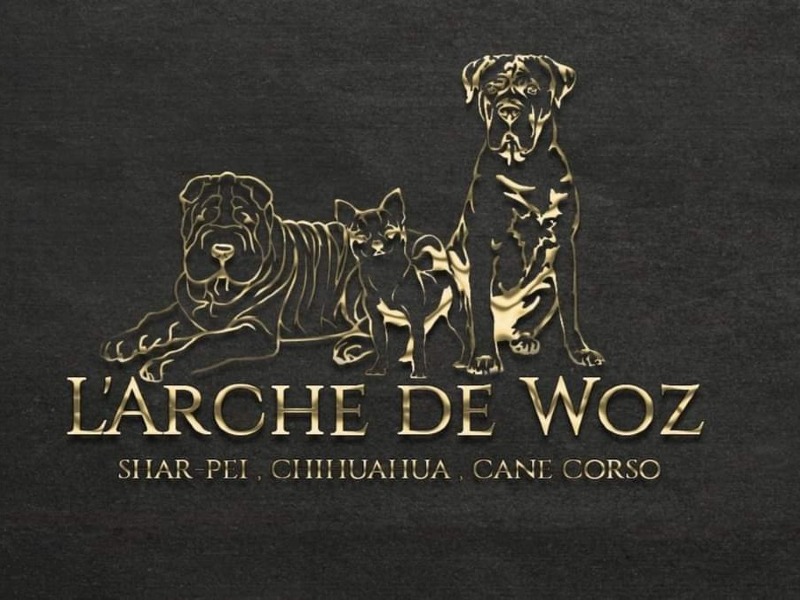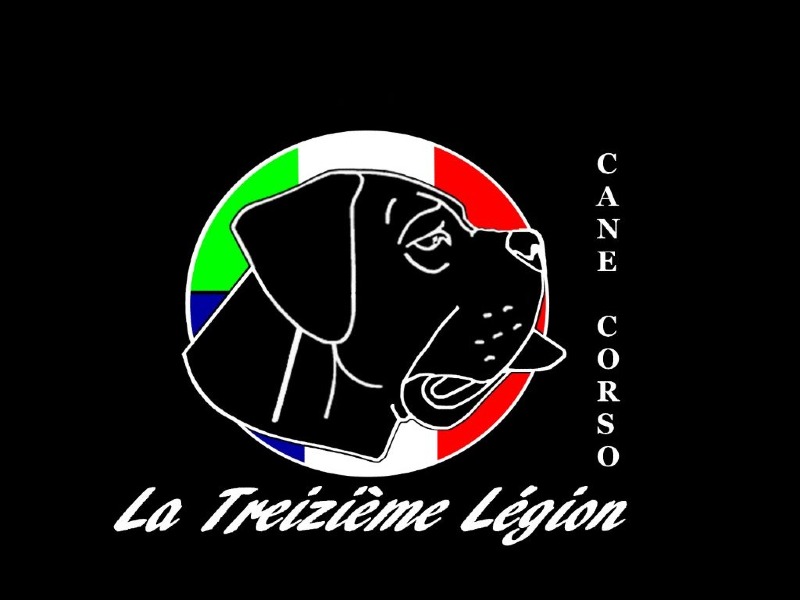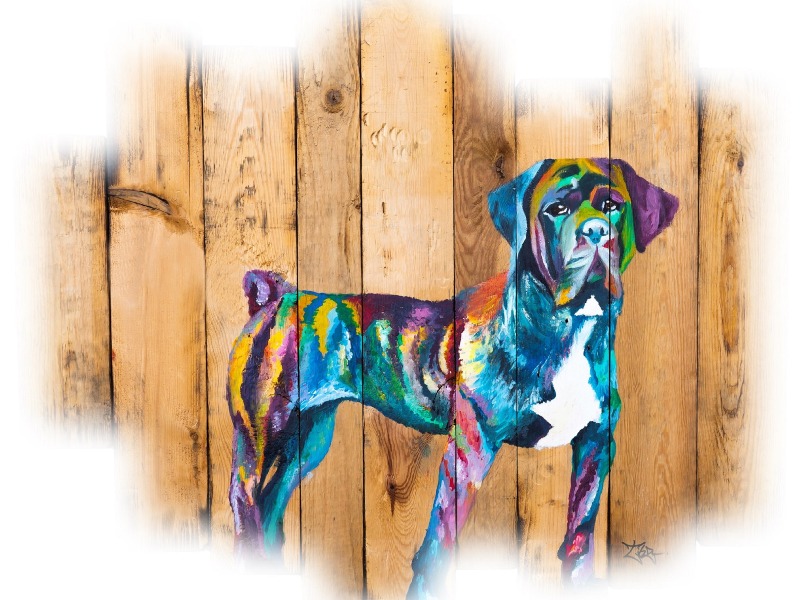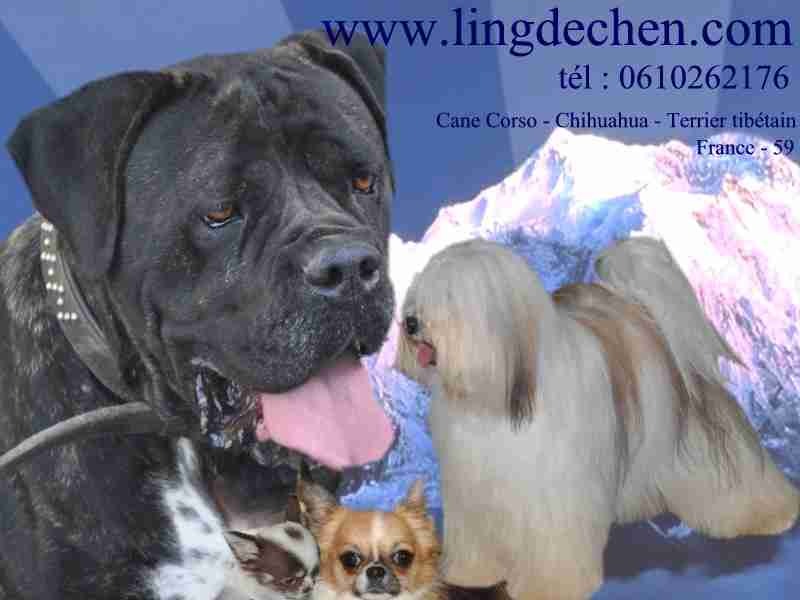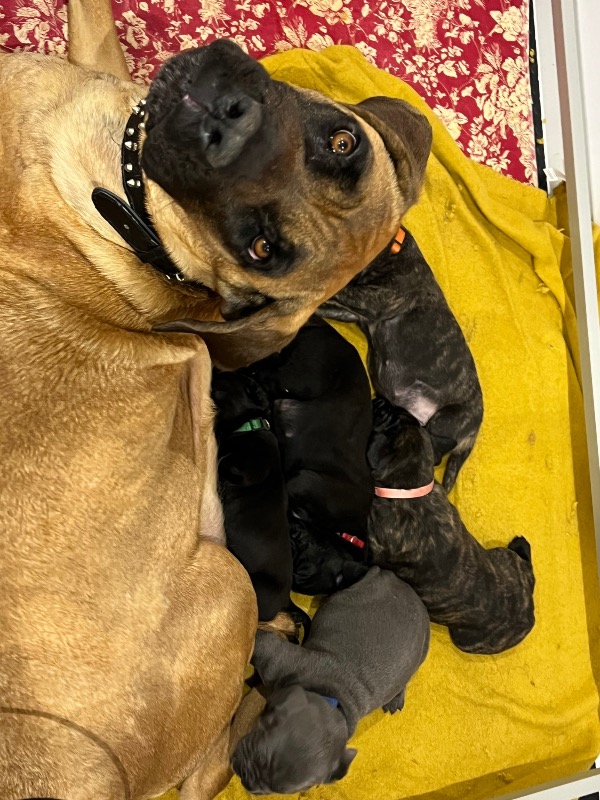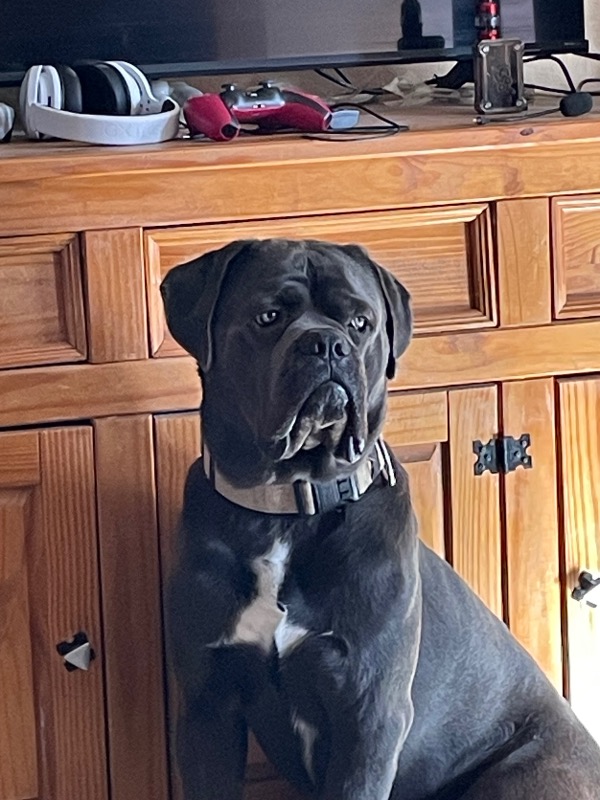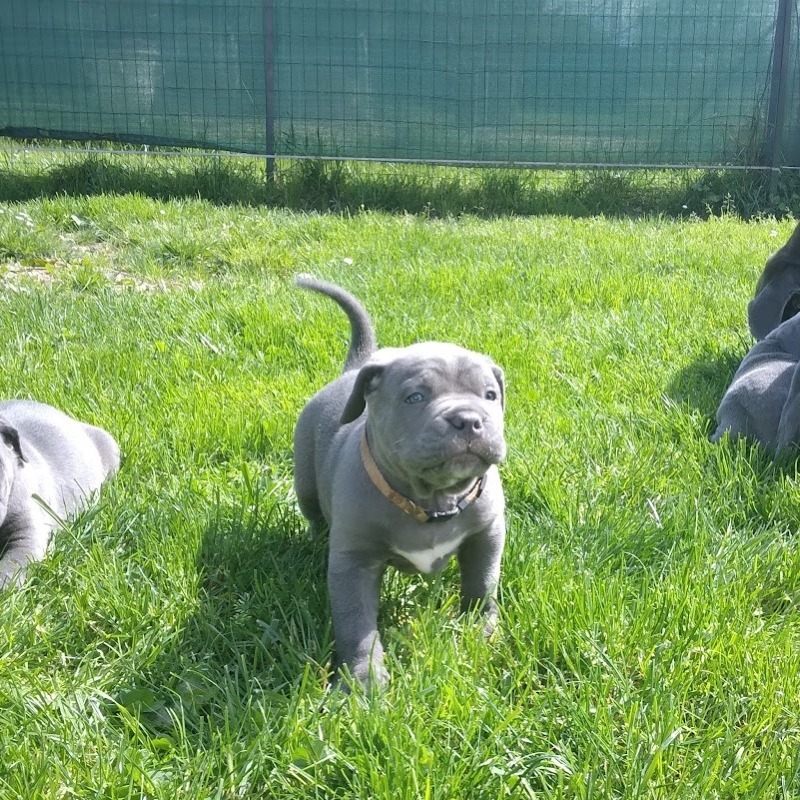Cane corso
Autres noms : Italian cane corso, Dogo di puglia, Italian mastiff
Discover the Cane Corso, a powerful and loyal dog, known for its protective nature and intelligence. Ideal for active families, it combines elegance and strength with a balanced temperament. Learn more about its characteristics, care, and specific needs.
Awareness of acquiring an animal
Adopting or breeding a dog is a responsibility that must be carefully considered. Dogs are loyal companions that require time, attention, and constant care. Whether for leisure, passion, or professional breeding, it is crucial to understand the specific needs of each breed. Provide them with a loving and stimulating environment, and avoid any impulsive acquisition that could harm their well-being. Be a vigilant and committed owner for a happy and healthy companion.
To learn more about animal welfare, we invite you to consult our FAQ by clicking the button below:
Origins and history
The Cane Corso is a dog breed that originated in Italy, with ancestors dating back to Roman times. Originally used as hunting and guard dogs, these robust and powerful dogs were also employed to protect livestock from predators. Their great physical strength and intelligence made them ideal companions for farmers and ranchers.
Over the centuries, the breed evolved, gradually losing popularity during the 20th century due to agricultural changes and urbanization. However, breed enthusiasts worked to preserve and restore the Cane Corso. In the 1970s, Italian breeders began promoting this breed and establishing standards, which led to official recognition by major kennel clubs.
Today, the Cane Corso is valued not only for its physical strength but also for its balanced temperament. Loyal, protective, and intelligent, it has become a sought-after family companion while still retaining guarding and protective instincts. However, the breed requires firm training and early socialization to thrive within the family.
Physical characteristics
The Cane Corso is a large, imposing, and muscular dog known for its robust appearance. Males typically stand between 60 and 70 cm at the shoulder, while females measure around 55 to 65 cm. Males usually weigh between 40 to 50 kg, while females weigh between 35 and 45 kg, reflecting a strong constitution.
Its head is broad and well-proportioned, with a slightly convex skull and prominent cheeks. The almond-shaped eyes are dark and convey great intelligence. The ears, often cropped, are of medium size and well-set, while the muzzle is wide and tapers towards the nose, which is usually black. The skin is tight, enhancing the impression of power.
The coat is short and dense, providing protection against the elements. There is a variety of colors, including black, gray, fawn, and brindle, among others. In summary, the Cane Corso is a dog that combines physical strength and elegance, while embodying an image of loyalty and vigilance.
Character
The Cane Corso is a dog breed known for its strength and agility. This dog is often described as a loyal and protective companion. Its nature is marked by a strong guarding instinct, making it an excellent protection dog for its family and home. This vigilance is accompanied by great intelligence, allowing them to learn commands and tasks quickly.
In addition to their role as guardians, individuals of this breed are generally affectionate with their families. They form strong bonds with their owners, displaying dedication and affection. Although they may be reserved towards strangers, they are not aggressive by nature. However, it is essential to socialize them from a young age to develop a good attitude towards people and other animals.
The Cane Corso also needs adequate mental and physical stimulation. Their temperament can vary depending on the environment in which they live and the training they receive. Consistent and positive training fosters balanced behavior, while a lack of structure can lead to destructive behaviors. In summary, this breed combines traits of protection, affection, intelligence, and energy, making it a fascinating companion that requires a certain level of commitment.
Life expectancy
The life expectancy of Cane Corso dogs generally ranges from 9 to 12 years. This lifespan can vary based on several factors, including genetics, diet, and the medical care received throughout their lives.
Genetics plays a crucial role in the longevity of a Cane Corso. Some individuals may be predisposed to hereditary health issues, such as hip dysplasia or heart problems. Therefore, it is recommended to choose a responsible breeder who conducts health tests on the parents before breeding.
A balanced diet tailored to the specific needs of the breed is also essential. Overweight dogs, for example, are more likely to develop health issues that can affect their life expectancy. A good exercise routine helps maintain a healthy weight and promotes overall well-being.
Finally, regular vet visits for health check-ups can allow for the early detection of potential health problems. By paying attention to these various aspects, it is possible to optimize the lifespan of a Cane Corso while ensuring its well-being.
Exercise and activity needs
The Cane Corso is a robust and muscular dog breed that requires specific exercise and activity needs. To maintain its physical and mental health, it is essential to provide sufficient daily activity. Generally, a Cane Corso needs at least an hour of exercise per day, divided into multiple walks and play sessions. These activities should include muscle-strengthening exercises, such as running, hiking, or tug-of-war games, which stimulate its endurance.
In addition to physical exercise, mental stimulation plays a crucial role in the well-being of this breed. Dogs of this lineage are intelligent and need challenges to avoid boredom. Obedience games, interactive puzzles, or agility training sessions can be integrated into their daily routine. Early and regular socialization is also important to help the Cane Corso adapt to various environments and interact positively with other animals and people.
Finally, a lack of sufficient activity can lead to undesirable behaviors, such as anxiety or destruction of objects. Therefore, it is essential to meet its exercise needs and enrich its daily life to ensure it remains happy and balanced.
Recommended diet
The Cane Corso is a robust and athletic dog breed that requires specific nutrition to maintain optimal health. It is essential to prioritize high-quality food that is rich in protein to support its muscle mass. Recommendations vary based on the dog's age, weight, and activity level. Puppies, for instance, need food specially formulated for healthy growth, rich in essential nutrients.
Adults benefit from a balanced diet that includes animal proteins such as chicken, beef, or fish. Healthy fats, such as those from fish oils, are also crucial for skin and coat health. Avoid foods containing by-products or fillers, as this can harm the animal's digestion and energy levels.
It is also important to monitor portion sizes to avoid obesity, a common issue in this breed. A good practice is to divide meals into two to three portions per day. Always remember to provide fresh and clean water. Supplements such as omega-3 fatty acids and vitamins can be beneficial, but it is advisable to consult a veterinarian before introducing new elements into your dog's diet.
Training and obedience
The Cane Corso is a large and powerful dog breed, requiring rigorous and consistent training from an early age. It is essential to start education in the first few months to establish a hierarchy and a trusting relationship between the dog and its owner. Early socialization is crucial; exposing the Cane Corso to various people, animals, and environments helps prevent fearful or aggressive behaviors in adulthood.
Training should be conducted in a positive manner, using rewards and encouragement rather than punishments. This approach promotes active cooperation and strengthens emotional bonds. Basic commands such as "sit," "lying down," and "come" should be taught systematically. A well-trained dog will be more receptive and confident, which will facilitate its integration into family life.
Finally, it is important to maintain a regular exercise routine. A Cane Corso needs physical and mental stimulation to avoid boredom and destructive behaviors. Varied activities, such as walks, brain games, and obedience classes, will help channel its energy and develop its obedience.
Behavior with children
The Cane Corso is a dog breed that stands out for its impressive size and powerful musculature. When it comes to behavior with children, it is important to remember that each dog is an individual, and its behavior largely depends on its upbringing, socialization, and experiences. Generally, the Cane Corso can be very protective towards its family members, including children. It tends to develop a strong bond with its young human companions and can be playful and affectionate.
However, due to its strength and energy, it is crucial to supervise interactions between the dog and children. Children must learn to respect the dog's space and not disturb it while eating or resting. Proper training from a young age is essential to prevent any undesirable behavior, such as excessive resource guarding. A well-socialized Cane Corso will be able to adapt to children and provide them with a reassuring presence.
It is also recommended to introduce the dog to children from a young age, so that it can get used to their noises and movements. Early socialization will play a key role in developing balanced and friendly behavior. To ensure safe and positive interactions, both parties, children and dog, should be supervised during playtime. Ultimately, a Cane Corso can be a wonderful companion for children, provided that its needs for training and socialization are met.
Compatibility with Other Animals
The Cane Corso is a large, powerful, and intelligent dog that can be an excellent companion for other pets, but this depends on several factors. First of all, its natural temperament plays a crucial role. When well-socialized from a young age, this dog can get along with other animals, including dogs and cats. Early socialization is essential for it to learn how to appropriately interact with other family members.
Next, the individual characteristics of each animal must be taken into account. All dogs, regardless of their breed, have different personalities. A well-raised and balanced Cane Corso can become the best friend of a cat or a small dog, while a fearful or poorly socialized animal may develop hunting or aggressive behaviors.
It is also important to consider the size and temperament of other pets. Smaller animals may be perceived as prey by certain dog breeds. Therefore, supervision is necessary during the initial interactions. A gradual introduction, accompanied by positive reinforcement, can help establish good relationships.
In summary, with proper socialization and constant attention, a Cane Corso can coexist harmoniously with other pets. However, it is always advisable to monitor interactions, especially at the beginning, to ensure the safety and well-being of all household members.
Grooming needs
The Cane Corso is a dog breed that requires relatively simple maintenance due to its short coat. Its fur is dense and needs regular brushing, ideally once a week. This helps to remove dead hair and reduce shedding. During shedding periods, more frequent brushing may be necessary to maintain cleanliness and skin health.
As for bathing, it is not necessary to bathe the dog too often; generally, every three months is sufficient, unless there is a need due to dirt or a particular odor. It is essential to use a gentle dog shampoo to preserve the health of its skin.
Dental care is also important. Regular tooth brushing, at least two to three times a week, helps prevent dental issues. Ears should be checked regularly to avoid infections, and it is advisable to trim the nails if they do not wear down naturally, which can be about once a month. Regular veterinary check-ups and attention to exercise needs will ensure a healthy Cane Corso.
Health
The Cane Corso is an impressive and robust dog breed, but like many breeds, it can be prone to certain health concerns. One of the most common conditions in this breed is hip dysplasia, a malformation of the joint that can lead to pain and mobility issues. It is essential for breeders to perform genetic testing on the parents to reduce the risk of passing on this condition.
Heart problems, particularly dilated cardiomyopathy, can also affect this breed. This disease causes weakening of the heart muscle, making it less effective at pumping blood. Regular check-ups at the veterinarian and careful attention to signs of heart disease are crucial for early detection.
Finally, Cane Corsos may be sensitive to dermatological issues, such as skin allergies. Regular veterinary care and a suitable diet help maintain their skin health. By providing preventive attention and appropriate care, it is possible to ensure better well-being for these dogs and maximize their life expectancy.
Environment and habitat
The Cane Corso is a dog breed originating from Italy, particularly suited for family environments where it can play a protective role. These animals are robust and need space to move freely. A fenced garden is ideal for allowing them to exercise and express their active nature.
In terms of habitat, a calm environment is preferable. This dog is sensitive to loud noises and fast movements, which can stress it. It thrives in a family atmosphere where it can regularly interact with its loved ones. The Cane Corso requires early socialization and regular exercise, which encourages it to integrate harmoniously into the daily life of its owners.
Air quality and the temperature of the environment also play an important role in the well-being of the Cane Corso. They do not tolerate extreme heat very well, so a cool place is necessary in summer. Finally, access to varied outdoor spaces, such as parks or fields, enriches their environment, promoting their mental and physical health.
Name ideas
Choosing a name for a dog, especially for a breed like the Cane Corso, requires considering several elements to ensure smooth and effective communication. First, it is essential that the name is short and easy to pronounce. Dogs respond better to clear sounds, so opt for words with one or two syllables. Additionally, a distinctive name that does not resemble common commands like "sit" or "come here" will help avoid any confusion during training.
Next, think about your Cane Corso's personality and appearance, which is generally powerful and protective. A name that reflects these characteristics can strengthen the bond you have with your pet. You can also draw inspiration from culture, history, or the physical traits of the breed.
Here are about fifteen name suggestions: Titan, Max, Astra, Kira, Zeus, Torben, Nox, Bella, Valor, Rocco, Serta, Nova, Kodiak, Goliath, and Luna. These names are both simple and evocative, making them perfectly suited for a Cane Corso. Choose the one that resonates the most with you and your companion.
Average purchase price
The price of a Cane Corso dog can vary significantly depending on several factors. Generally, the average cost of a puppy from a reputable breeder can range between 1500 and 3000 euros. This price can be influenced by the breeder's reputation, the dog's lineage, and the titles of its parents. Dogs coming from champion lines or having exceptional characteristics can significantly increase the price.
It is also important to consider additional expenses related to purchasing a pet. This includes costs for vaccinations, parasite treatments, and health certificates, which can amount to several hundred euros. Furthermore, food, regular veterinary care, and necessary accessories, such as a crate, toys, and grooming equipment, should also be considered in the overall budget.
Finally, adopting a Cane Corso from a shelter or rescue organization can represent a more economical alternative, with adoption fees ranging from 200 to 500 euros. This not only provides a second chance for an animal but also helps reduce initial costs.
Expenses
Owning a Cane Corso can lead to various expenses that depend on several factors such as the dog's age, health, and lifestyle. On average, monthly costs can amount to around 100 to 150 euros.
The main expenses include food, which is essential for ensuring a balanced diet. For a Cane Corso, quality food can cost between 50 and 80 euros per month, depending on the brands and types of food chosen. It is crucial to prioritize kibble that is high in protein, suitable for the size and energy level of this breed.
Veterinary care is another significant part of the monthly budget. Considering vaccinations, deworming, and potential consultations, it is reasonable to budget about 20 to 30 euros per month. Additionally, it's important not to overlook health insurance, which can vary from 10 to 50 euros per month, depending on the level of coverage.
Finally, additional expenses such as maintenance costs (grooming, accessories, toys) and activities (training, canine sports) should also be considered, which can add an extra 20 to 40 euros monthly. In summary, planning a budget of around 150 to 250 euros per month to ensure the well-being of your Cane Corso is wise.
Destination and usage
The Cane Corso is a dog breed known for its protective personality and attachment to its family. As a pet, it is particularly appreciated for its loyalty and dedication within a household. This dog adapts well to family life, forming strong bonds with both children and adults. Its vigilant nature makes it an excellent guardian, providing a sense of security to those around it.
In terms of living environment, the Cane Corso is often chosen for homes with a garden where it can expend energy freely. It requires a stimulating environment that allows it to express its natural instincts. With its energy, it easily engages in activities such as walks, games, and training, proving to be an ideal companion for active families.
Moreover, education is crucial for this breed. Training from a young age promotes balanced behavior and ensures sociability with other animals and people. This dog, endowed with great intelligence, enjoys challenges, making it receptive to commands and instructions. In summary, the Cane Corso, as a pet, represents a loving and protective presence within households.
Legislation and regulation
The legislation regarding this breed of dogs varies greatly from country to country, reflecting specific cultural, historical, and safety concerns. In some countries, this breed is classified as a dangerous dog, resulting in restrictions on its ownership. This may include the requirement for special insurance, mandatory training, and sometimes even a permit to keep such animals.
In other regions, laws are less stringent. However, owners must still prove that their dogs are well-socialized and obedient, and regulations exist to govern their behavior in public. Thus, the responsibility often falls on the owners, who must ensure that their animals do not pose a threat to the community.
Across Europe, several countries have adopted restrictive laws concerning this breed, imposing strict conditions for its ownership. Awareness campaigns are also educating the public about the particular needs of these animals, emphasizing the importance of proper training to prevent incidents. In summary, legislation varies widely, highlighting the importance of increased awareness and responsibility on the part of owners.
Official recognition
The Cane Corso is a dog breed originating from Italy, recognized for its strength and majestic appearance. Its official recognition varies depending on the countries and canine organizations. In Italy, the breed is officially recognized by the ENCI (Ente Nazionale Cinofilia Italiana), the national organization for cynology, which plays a key role in preserving the breed standards.
In France, the Cane Corso is also recognized by the Société Centrale Canine (SCC), which establishes breed standards and organizes dog shows. This recognition contributes to the increasing popularity of the breed, both as a companion dog and as a guard dog.
In other European countries, such as Germany and Spain, national canine organizations also recognize this breed. In the United States, the Cane Corso is recognized by the American Kennel Club (AKC), which has led to an increase in its presence in the pet market.
It is important to note that some countries may have specific regulations regarding the ownership of this breed, especially concerning dogs considered to have a potential for danger. This influences the education and behavior of owners towards their animals, ensuring harmonious coexistence with society.
Pedigrees
To obtain a pedigree for a Cane Corso, it is essential to contact recognized organizations that manage the records of purebred dogs. In Europe, the Fédération Cynologique Internationale (FCI) is the main entity that sets breed standards and recognizes national clubs. These clubs must be affiliated with the FCI to issue pedigrees that comply with breed standards.
In France, the Club Français du Cane Corso (CFCC) is one of the main organizations responsible for registering Cane Corsos. It ensures that dogs conform to established standards, organizes exhibitions, and provides information on breeding and training Cane Corsos.
In the United States, the United Kennel Club (UKC) and the American Kennel Club (AKC) also offer registrations for Cane Corsos. These clubs promote the breed, the health of individual dogs, and educate owners about the specific behaviors and needs of the breed.
To obtain a pedigree, owners typically need to provide documents proving their pet's lineage as well as its compliance with breed criteria. These registrations are important to ensure genealogical traceability and the quality of the breed.
Prohibitions
The Cane Corso is a breed of dog originating from Italy, known for its imposing stature and protective nature. In many countries, this breed is subject to specific regulations due to its power and behavioral potential. Generally, the bans or restrictions affecting this breed can vary significantly from place to place.
In some countries, such as France, regulations govern the ownership of dogs considered dangerous. These laws may include requirements for muzzles, leashing in public, or even restrictions on breeding. Other regions, like certain provinces in Canada, impose bans that can go as far as a complete prohibition of the breed. These decisions are often motivated by incidents of aggression or bites involving large dogs.
In contrast, countries like Italy do not have specific bans, as this breed is an integral part of their cultural heritage. As awareness of dog training and owner responsibility increases, some countries are revising their laws to focus more on the individual behavior of the animal rather than on the breed itself.
Breeders of Cane corso
Want to see more breeders of Cane corso?
Check out the page of our directory listing all breeders of Cane corsoClassified Ads of Cane corso
Breed clubs of cane corso
No of cane corso breed clubs are currently registered on Preeders.
If you would like to highlight your breed club, sign up for free now and be the first to appear on this page.

